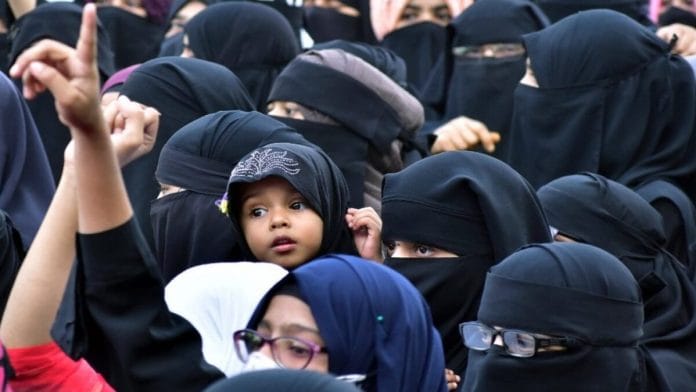Chennai: In 2016, then 21-year-old Rizvana N.M. met the then Kerala finance minister Dr T.M. Thomas Isaac at an event conducted in her college. During the interactive session, she was called to the stage to accept a gift for asking the former minister a question.
A few days later, visuals from the event emerged on social media, showing Rizvana shaking hands with the minister, accompanied by claims that she had violated Sharia law.
Rizvana came to know that a WhatsApp video was also circulating, containing the speech of a Malappuram resident Abdul Noushad, explaining that she had violated the Sharia Law by shaking the minister’s hand and that she, an adult, had also allegedly committed adultery by touching another man.
Rizvana, now a practicing lawyer in Kasargod, told ThePrint that she felt compelled to take action after realizing the video would create trouble for her and her family. Within days, with the support of her family and friends, she filed a complaint against Noushad, alleging that he had brought disgrace to her and her family under Section 153 (intentionally or wantonly provoking a riot through illegal means) of the Indian Penal Code (IPC), and Section 119(a) (degrading the dignity of women in public places) of the Kerala Police Act, 2011. In response, Noushad later moved the court to have the case against him quashed.
“As women, we are subjected to many comments daily. When it happens, many women don’t know we can approach the judiciary. I am happy that I made the effort, and if it helps other women to do the same, I’m really happy about it,” Rizvana said to ThePrint Wednesday.
On 1 October, Kerala High Court dismissed the petition filed by the accused seeking to quash the case against him. Justice P.V. Kunhikrishnan said the petitioner shouldn’t have attacked the woman when she voluntarily decided to give the minister a handshake.
“Religious beliefs are personal. There is no compulsion in religion, especially in Islam. One cannot compel another to follow his religious practice by the latter,” said Justice P.V. Kunhikrishnan on 1 October.
“a young brave Muslim girl comes forward and says that it violates her personal freedom of religious belief. In such situations, our constitution will protect her interest. Moreover, the society must support her,” the court added.
Reacting to the verdict, Rizvana said the court underlined the importance of individuality for a human.
“It’s the need for the society,” she said, adding that she never wanted to question religious beliefs or customs through this case.
“I believe that Islam gives complete freedom to women. But we interpret it wrong, mostly based on individual readings,” Rizvana said.
Also read: ‘Men will now abandon, not divorce’ – Muslims divided over Supreme Court alimony verdict
What the court said
“Shaking hands is a traditional gesture that conveys greeting, respect, courtesy, agreement, deal, friendship, solidarity,” said Justice Kunhikrishnan. The judge observed that physical contact between unrelated members of the opposite sex, including a handshake, is generally considered ‘haram’ (forbidden) in Islam.
“Surah AlBaqarah (2:256) says that there is no compulsion in religion,” he stated.
The judge added that religious practice is the personal choice of every citizen of India
“All persons are equally entitled to freedom of conscience and the right freely to profess, practice and propagate religion. Propagate religion does not mean that religious practice should be imposed on others,” the order said, adding that the young woman has the right to follow a religious practice in her own way.
The court further observed that there are age-old practices and conventions in all religions which some might agree or disagree with.
“If the prosecution case is correct and proved through cogent evidence, it is a serious thing which will intrude on the personal liberty of the second respondent,” the court said.
(Edited by Zinnia Ray Chaudhuri)
Also read: From Shah Bano to marriage laws: What SC said about maintenance for Muslim women







We need more women to assert themselves in Indian society. Women should take the streets for their rights especially for basic rights like crminalization of marital rape. No govt can oppose basic rights to women in this age.
There cant be more. The threats of Sar Tan Se Juda exist. Emotionally triggered violence by Muslims will never be addressed, since that is fascist. Neither courts nor community leaders will lead any sort of inspection of the ills in this community. If you say anything against them, there is a threat to your life.
Wish there were many more Rizvanas across India. The Muslim women must assert themselves. Muslim society won’t change for the better unless the women force it to do so.